WMG News
Largest miscarriage research centre in Europe to benefit from IDH expertise
 The University of Warwick has been selected to be a partner in the largest miscarriage research centre in Europe.
The University of Warwick has been selected to be a partner in the largest miscarriage research centre in Europe.
Funded by the leading pregnancy charity, Tommy’s, researchers from the Institute of Digital Healthcare (IDH) and Warwick Medical School (WMS), will be joining doctors from University Hospital, Coventry to investigate the causes of early miscarriage.
The Institute of Digital Healthcare, at the University of Warwick, will develop a clinical database, led by Professor Theo Arvanitis, to support the work of the Centre and improve on outcomes based on information-driven approaches.
Call for Papers - WMG Doctoral Research and Innovation Conference
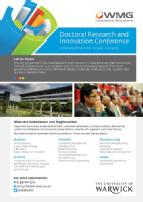 The 2nd annual WMG Doctoral Research and Innovation Conference, entitled ‘Innovation through Collaboration’, is an excellent opportunity to showcase research from both academia and industry across themes in design, materials, manufacturing, systems and business transformation.
The 2nd annual WMG Doctoral Research and Innovation Conference, entitled ‘Innovation through Collaboration’, is an excellent opportunity to showcase research from both academia and industry across themes in design, materials, manufacturing, systems and business transformation.
Organised by doctoral students, the conference will be held in the International Digital Laboratory on 30th June - 1st July, with an evening social event on the 30th.
Papers and poster presentations will take place across a wide variety of topics and awards will be presented in each theme.
Abstracts should be submitted online by 31st March.
Fostering Digital Healthcare Collaborations
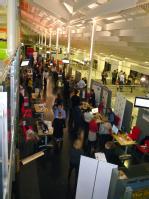 On 28 January 2015, the Institute of Digital Healthcare (IDH) at WMG hosted Fostering Digital Healthcare Collaborations, an event organised by the West Midlands Health Informatics Network (WIN). WIN is a West Midlands Academic Health Science Network-supported project, hosted by IDH.
On 28 January 2015, the Institute of Digital Healthcare (IDH) at WMG hosted Fostering Digital Healthcare Collaborations, an event organised by the West Midlands Health Informatics Network (WIN). WIN is a West Midlands Academic Health Science Network-supported project, hosted by IDH.
The aim of this event was to encourage networking and partnerships across stakeholder groups from around the West Midlands and beyond, the ultimate aim of which is to improve outcomes for patients and carers.
The programme included scheduled talks from exhibitors, with show-and-tell sessions, to showcase research, products and services.
WMG sponsors 'SET for Britain' Silver Award
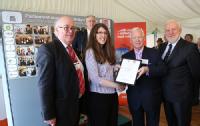 WMG congratulates Claire Donaghue who won the Silver Engineering Award at the 2014 SET for Britain Poster Competition which took place at the Houses of Parliament today.
WMG congratulates Claire Donaghue who won the Silver Engineering Award at the 2014 SET for Britain Poster Competition which took place at the Houses of Parliament today.
WMG sponsored the Silver Engineering Award which was presented to Claire by Dr David Clark, Principal Fellow at WMG.
Claire Donaghue is a PhD student from the Centre of Excellence for Medical Engineering Solutions in Osteoarthritis at Imperial College. Claire won the Silver Award for her poster on ‘Teaching Machines to Diagnose Osteoarthritis from MRI Scans’.
Professor Theo Arvanitis joins WMG as Professor of e-Health Innovation
 WMG is pleased to welcome Professor Theo Arvanitis today (1st November). He joins the Institute of Digital Healthcare team as Professor of e-Health Innovation.
WMG is pleased to welcome Professor Theo Arvanitis today (1st November). He joins the Institute of Digital Healthcare team as Professor of e-Health Innovation.
Professor Arvanitis is a specialist in biomedical engineering, neuroimaging and health informatics. He has a substantial academic publication record with over 300 publications, while he has received research funding from national (UK), European and international governmental funding agencies, charities and industry.
New Director to lead the Institute of Digital Healthcare
 It has been announced today that Professor Sudhesh Kumar, in addition to being recently appointed the Deputy Dean of Warwick Medical School, has also been appointed as the new Director of the Institute of Digital Healthcare.
It has been announced today that Professor Sudhesh Kumar, in addition to being recently appointed the Deputy Dean of Warwick Medical School, has also been appointed as the new Director of the Institute of Digital Healthcare.
The Institute of Digital Healthcare (IDH) is a partnership with NHS Midlands and East, WMG and Warwick Medical School (WMS), which aims to improve people’s health and wellbeing through the development, evaluation and use of innovative digital technologies and services.
Professor Kumar will be leading a new team that draws on a wide range of backgrounds including biomedical engineering, health informatics, biomedical imaging, healthcare virtual reality and neural engineering.
WMG appoints new Professors in E-Health Innovation and Operations and Supply Chain Strategy
WMG at the University of Warwick has appointed two new Professors who will be taking up key roles and leading research in the fields of E-Health Innovation and Operations and Supply Chain Strategy.
Professor Jan Godsell, a specialist in supply chain management, will be Professor of Operations and Supply Chain Strategy within WMG from the 1st October and Professor Theo Arvanitis will be joining WMG in November to lead E-Health Innovation as part of the Institute of Digital Healthcare.
WMG Professor wins coveted engineering accolade
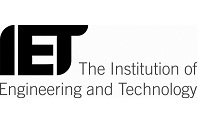 Professor Christopher James, Professor of Healthcare Technologies and Director of the Institute of Digital Healthcare at WMG, University of Warwick, has been awarded the Sir Monty Finniston Award for Achievement, one of the Institution of Engineering and Technology’s (IET) Achievement Awards.
Professor Christopher James, Professor of Healthcare Technologies and Director of the Institute of Digital Healthcare at WMG, University of Warwick, has been awarded the Sir Monty Finniston Award for Achievement, one of the Institution of Engineering and Technology’s (IET) Achievement Awards.
The Achievement Awards, which recognise some of the world’s top engineering talent, acknowledge individuals who have made an exceptional contribution to the advancement of science, engineering and technology in any sector, either through research and development in their respective technical field or through their leadership of an enterprise.
Professor James is a biomedical engineer and his research activity centers on the development of biomedical signal and pattern processing techniques, as well as the use of technological innovations, for use in advancing healthcare and promoting wellbeing. Professor James has published over 150 papers in neural engineering in varied biomedical engineering journals and refereed conferences. He is also Director of the Institute of Digital Healthcare, a collaboration between WMG, Warwick Medical School and NHS West Midlands with the aim of improving people's health and wellbeing through the use of innovative digital technologies in healthcare design and delivery.
Professor Christopher James named as Editor in Chief of IET's new journal
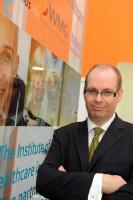 Professor Christopher James, Director of the Institute of Digital Healthcare at WMG, has been named as Editor in Chief of IET's new journal, Healthcare Technology Letters.
Professor Christopher James, Director of the Institute of Digital Healthcare at WMG, has been named as Editor in Chief of IET's new journal, Healthcare Technology Letters.
The Journal’s scope will be interdisciplinary, primarily focusing on the latest advances in engineering and computer and information science for healthcare. It will be most relevant to biomedical engineers and electrical engineers and computer scientists working in the biomedical field from academia and industry. This journal may also be of interest to clinical researchers and those working in medical fields seeking engineering solutions to healthcare challenges.
Submissions to ‘Healthcare Technology Letters’ will be possible in Autumn 2013 with first publication from January 2014. Original research papers up to six pages in length will be considered and videos and animations are welcomed as part of the paper.
£1.6m funding at the interface of statistics, healthcare and manufacturing
 Researchers at the University of Warwick have been awarded £1.1 million to develop the statistics needed to pool the vast quantities of data generated by brain scans.
Researchers at the University of Warwick have been awarded £1.1 million to develop the statistics needed to pool the vast quantities of data generated by brain scans.
The University has also been awarded £500,000 to improve quality control in 3D printing.
Both projects are joint between the Department of Statistics and WMG, exploiting the unique strengths of each group.
